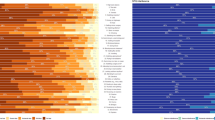Abstract
The process of PSA screening and subsequent monitoring of PSA levels may represent a great source of emotional distress to patients, the majority of whom are not adequately informed about the screening process and the implications of an abnormal result. The need remains for education of patients on the subject, but no consensus has been reached as to the content of information men should be offered. Helping patients to attribute a different meaning to a potentially stressful event can avoid the development of emotional distress, and physicians can have an important role in this process. Informing patients is essential to allow the development of positive coping styles, and establishing good doctor–patient communication leads to improved compliance and the improvement of patients' psychological wellbeing.
This is a preview of subscription content, access via your institution
Access options
Subscribe to this journal
Receive 12 print issues and online access
$209.00 per year
only $17.42 per issue
Buy this article
- Purchase on Springer Link
- Instant access to full article PDF
Prices may be subject to local taxes which are calculated during checkout
Similar content being viewed by others
References
Essink-Bot, M. L. et al. Short-term effects of population-based screening for prostate cancer on health-related quality of life. J. Natl Cancer Inst. 90, 925–931 (1998).
Oliffe, J. Being screened for prostate cancer: a simple blood test or a commitment to treatment? Cancer Nurs. 29, 1–8 (2006).
Schulmann, C. C., Kirby, R. & Fitzpatrick, J. M. Awareness of prostate cancer among the general public: findings of an independent international survey. Eur. Urol. 44, 294–302 (2003).
Hewitson, P. & Austoker, J. Part 2: patient information, informed decision-making and the psycho-social impact of prostate-specific antigen testing. BJU Int. 95 (Suppl. 3), 16–32 (2005).
Chan, E. C. et al., Informed consent for cancer screening with prostate-specific antigen: how well are men getting the message? Am. J. Public Health 93, 779–785 (2003).
Wolf, A. M., Nasser, J. F., Wolf, A. M. & Schorling, J. B. The impact of informed consent on patient interest in prostate-specific antigen screening. Arch. Intern. Med. 156, 1333–1336 (1996).
Dale, W., Bilir, P., Han, M. & Meltzer, D. The role of anxiety in prostate carcinoma: a structured review of the literature. Cancer 104, 467–478 (2005).
Gattellari, M. & Ward, J. E. Men's reactions to disclosed and undisclosed opportunistic PSA screening for prostate cancer. Med. J. Aust. 182, 386–389 (2005).
Gattellari, M. & Ward, J. E. A community study using specified and unspecified scenarios to investigate men's views about PSA screening. Health Expect. 7, 274–289 (2004).
Carlsson, S., Aus, G., Wessman, C. & Hugosson, J. Anxiety associated with prostate cancer screening with special reference to men with a positive screening test (elevated PSA)—results from a prospective, population-based, randomised study. Eur. J. Cancer 43, 2109–2116 (2007).
Brindle, L. A. et al. Measuring the psychosocial impact of population-based prostate-specific antigen testing for prostate cancer in the UK. BJU Int. 93, 777–782 (2006).
Macefield, R. C. et al. Do the risk factors of age, family history of prostate cancer or a higher prostate specific antigen level raise anxiety at prostate biopsy? Eur. J. Cancer doi:10.1016/j.ejca.2009.03.016.
Roth, A. et al. The memorial anxiety scale for prostate cancer: validation of a new scale to measure anxiety in men with prostate cancer. Cancer 97, 2910–2918 (2003).
Roth, A. & Passik, S. Anxiety in men with prostate cancer may interfere with effective management of the disease. Primary Care Cancer 16, 30–37 (1996).
Lofters, A., Juffs, H. G., Pond, G. R. & Tannock, I. F. “PSA-itis”: knowledge of serum prostate specific antigen and other causes of anxiety in men with metastatic prostate cancer. J. Urol. 168, 2516–2520 (2002).
Christie, K. M., Meyerowitz, B. E., Giedzinska-Simons, A., Gross, M. & Agus, D. B. Predictors of affect following treatment decision-making for prostate cancer: conversations, cognitive processing, and coping. Psychooncology 18, 508–514 (2009).
Wilkinson, S., Warren, K., Ramsden, A., Matthews, A. & Chodak, G. Do “rapid” PSA assays reduce anxiety and stress of prostate cancer patients undergoing regular review? A prospective evaluation. Urology 71, 567–572 (2008).
Varetto, A. & Torta, R. La comunicazione e il consenso informato. In Psiconcologia. Il modello biopsicosociale (Eds Torta, R. & Mussa, A.) 89–110 (Centro Scientifico Editore, Torino, 2007).
Costantini, A. et al. Discussion about switch strategy in the adjuvant hormonal therapy of breast cancer: psychological aspects of physician–patient communication. Ann. Oncol. doi:10.1093/annonc/mdp057 (in press).
Ward, J. E., Gupta, L. & Taylor, N. Do general practitioners use prostate-specific antigen as a screening test for early prostate cancer? Med. J. Aust. 169, 29–31 (1998).
Whitson, J. M. & Konety, B. R. Should men over the age of 65 years receive PSA screening? Argument in favor. Nat. Clin. Pract. Urol. 5, 230–231 (2008).
Albertsen, P. C. Should men over the age of 65 years receive PSA screening? Argument against. Nat. Clin. Pract. Urol. 5, 232–233 (2008).
Gattellari, M. et al. Does 'peer coaching' increase GP capacity to promote informed decision making about PSA screening? A cluster randomised trial. Fam. Pract. 22, 253–265 (2005).
Baile, W. F. et al. SPIKES—a six-step protocol for delivering bad news: application to the patient with cancer. Oncologist 5, 302–311 (2000).
Back, A. L., Arnold, R. M., Tulsky, J. A., Baile, W. F. & Fryer-Edwards, K. A. Teaching communication skills to medical oncology fellows. J. Clin. Oncol. 21, 2433–2436 (2003).
Author information
Authors and Affiliations
Corresponding author
Ethics declarations
Competing interests
The authors declare no competing financial interests.
Rights and permissions
About this article
Cite this article
Torta, R., Munari, J. Psychological aspects of PSA testing. Nat Rev Urol 6, 513–515 (2009). https://doi.org/10.1038/nrurol.2009.146
Issue Date:
DOI: https://doi.org/10.1038/nrurol.2009.146
This article is cited by
-
Perceptions about screening for prostate cancer using genetic lifetime risk assessment: a qualitative study
BMC Family Practice (2018)
-
Prostate specific antigen testing is associated with men’s psychological and physical health and their healthcare utilisation in a nationally representative sample: a cross-sectional study
BMC Family Practice (2014)



